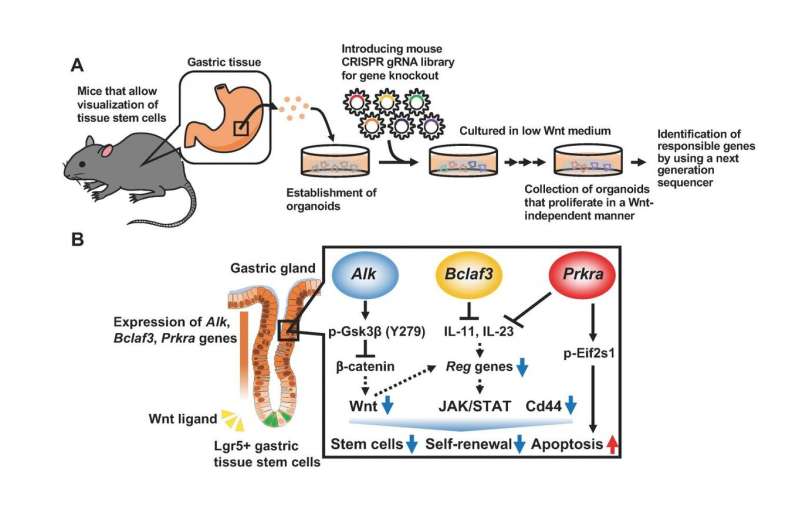A. Outline of GeCKO screening using organoids. Gastric organoids are established from mice that allow visualization of tissue stem cells; genes are randomly rendered loss-of-function by introducing a mouse CRISPR gRNA library for gene knockout. Thereafter, organoids that proliferate in a Wnt signaling-independent manner are collected and responsible genes are identified by using a next generation sequencer.B. The important point revealed in this study. The genes Alk, Bclaf3 and Prkra are expressed in differentiated cells of gastric glands. Alk destabilizes Gsk3β by phosphorylation, thus suppressing Wnt signaling. On the other hand, Bclaf3 and Prkra negatively regulate Reg gene expressions that are essential for proliferation of gastric epithelial cells through suppressing the expression of interleukins 11 (IL-11) and 23 (IL-23). It is thought that the stemness of gastric tissue stem cells is determined by cooperation of Alk, Bclaf3 and Prkra. Credit: Kanazawa University
The human body consists of about 60 trillion cells that are renewed day by day to maintain homeostasis of body tissues. In particular, cells of the digestive tract are renewed completely within several weeks thanks to vigorous proliferation where tissue stem cells of every tissue play critical roles in supplying those cells. Tissue stem cells play essential roles in various phenomena such as histogenesis and recovery from damage by producing differentiated cells while dividing. They do this by producing identical cells (self-renewal) or by differentiating into other types of cells. The research team led by Profs. Murakami and Barker of the Cancer Research Institute, Kanazawa University revealed the presence of gastric tissue stem cells expressing the Lgr5 gene, a tissue stem cell marker at the gastric gland base in the gastric tissue, the stemness of which could be suppressed by Wnt signaling (Leushacke M. et al., Nat. Cell Biol., 2017). However, due to the technical difficulty of further detailed in vivo verification, most of the molecular mechanisms related to tissue stem cells regulated by Wnt signaling remained a mystery.
The research team investigated the intracellular molecular mechanisms for Wnt signaling-dependent regulation of proliferation and self-renewal of gastric tissue stem cells by using organoids established from mice. These enabled visualization of Lgr5+ gastric tissue stem cells. Further, screening using Genome-Scale CRISPR Knock-Out (GeCKO), which can arbitrarily produce loss-of-function of various genes, allowed the elucidation of molecular mechanisms regulating the Wnt signaling-dependence of gastric tissue stem cells. The team revealed that loss-of-function of Alk, Bclaf3 and Prkra genes induced Wnt signaling-independent proliferation of the organoids. Because these genes are expressed in differentiated cells of mouse gastric tissues but not in stem cells, the team postulated that these genes might negatively regulate the stemness of tissue cells. Further analyses have revealed that Alk suppresses Wnt signaling by phosphorylating Gsk3β, one of the regulatory factors of Wnt signaling. Further, Bclaf3 and Prkra regulate the expression of Reg family genes, which are essential for proliferation of gastric tissue stem cells, by inhibiting expression of epithelial interleukins 11 and 23. From these results, Alk, Bclaf3 and Prkra have been identified as the genes that determine the stemness of gastric tissue stem cells.
The present study has elucidated previously unknown molecular mechanisms regulating the self-renewal and differentiation of tissue stem cells, which play roles in tissue homeostasis and recovery from damage. Similar molecular mechanisms may exist and function in other tissue stem cells, since Wnt signaling is widely activated in various stem cells regardless of their developmental stages. It is expected that treatments for tissue damage, not only of the digestive tract but also in liver, kidney and pancreas, should become possible if regulation of the self-renewal and differentiation of stem cells via the regulatory mechanisms described above could be verified in other tissues. The results of the present study provide new insights and technical approaches in stem cell research and are expected to stimulate innovation in the field of regenerative medicine and cancer treatment in the future.
More information: Kazuhiro Murakami et al, A genome-scale CRISPR screen reveals factors regulating Wnt-dependent renewal of mouse gastric epithelial cells, Proceedings of the National Academy of Sciences (2021). DOI: 10.1073/pnas.2016806118
Journal information: Proceedings of the National Academy of Sciences
Provided by Kanazawa University
























